AC Replacement Cambridge
Find top AC Replacement in Cambridge
Receive up to 3 Air Conditioner Replacement quotes for your project today! Compare profiles, reviews, accreditations, portfolio, etc... and choose the best service.
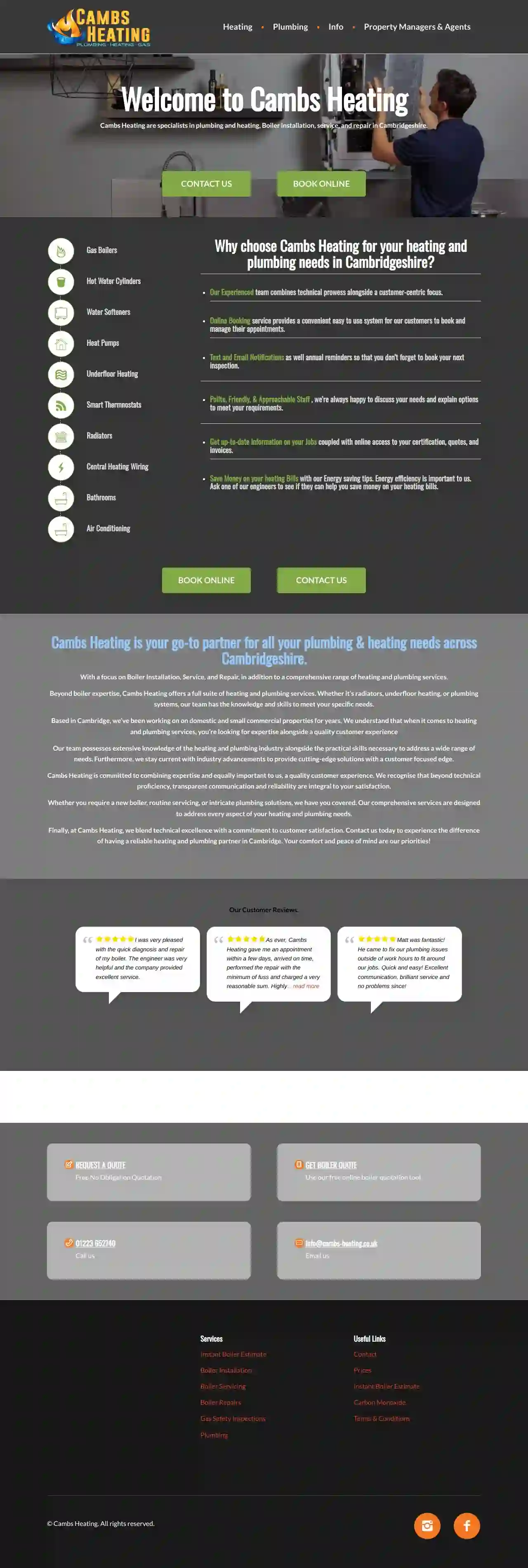
Cambs Heating Ltd
4.991 reviewsCambridge, GBWelcome to Cambs Heating, your go-to partner for all your plumbing & heating needs across Cambridgeshire. With a focus on Boiler Installation, Service, and Repair, in addition to a comprehensive range of heating and plumbing services. Beyond boiler expertise, Cambs Heating offers a full suite of heating and plumbing services. Whether it’s radiators, underfloor heating, or plumbing systems, our team has the knowledge and skills to meet your specific needs. Based in Cambridge, we’ve been working on on domestic and small commercial properties for years. We understand that when it comes to heating and plumbing services, you’re looking for expertise alongside a quality customer experience. Our team possesses extensive knowledge of the heating and plumbing industry alongside the practical skills necessary to address a wide range of needs. Furthermore, we stay current with industry advancements to provide cutting-edge solutions with a customer focused edge. Cambs Heating is committed to combining expertise and equally important to us, a quality customer experience. We recognise that beyond technical proficiency, transparent communication and reliability are integral to your satisfaction. Whether you require a new boiler, routine servicing, or intricate plumbers in Cambridge, we have you covered. Our comprehensive services are designed to address every aspect of your heating and plumbing needs. Finally, at Cambs Heating, we blend technical excellence with a commitment to customer satisfaction. Contact us today to experience the difference of having a reliable heating and plumbing partner in Cambridge. Your comfort and peace of mind are our priorities!
- Services
- Why Us?
- Gallery
Get Quote
Coolflow Air Conditioning
512 reviewsHuntingdon, GBWelcome to CoolFlow AC Ltd, based in Huntingdon, Cambridgeshire. We specialise in commercial & domestic air conditioning installations, repairs and maintenance. Our skilled and experienced team can install, repair and service your air conditioning system to the highest of standards with customer satisfaction our top priority. We can install and service a wide range of systems to cater for any climate control needs you may have. From the smallest domestic split system to large commercial VRF multi unit systems. No job is too small or too big. For more information please see our services or get in touch today. Our team is always happy to help.
- Services
- Why Us?
- Our Team
- Testimonials
- Gallery
Get Quote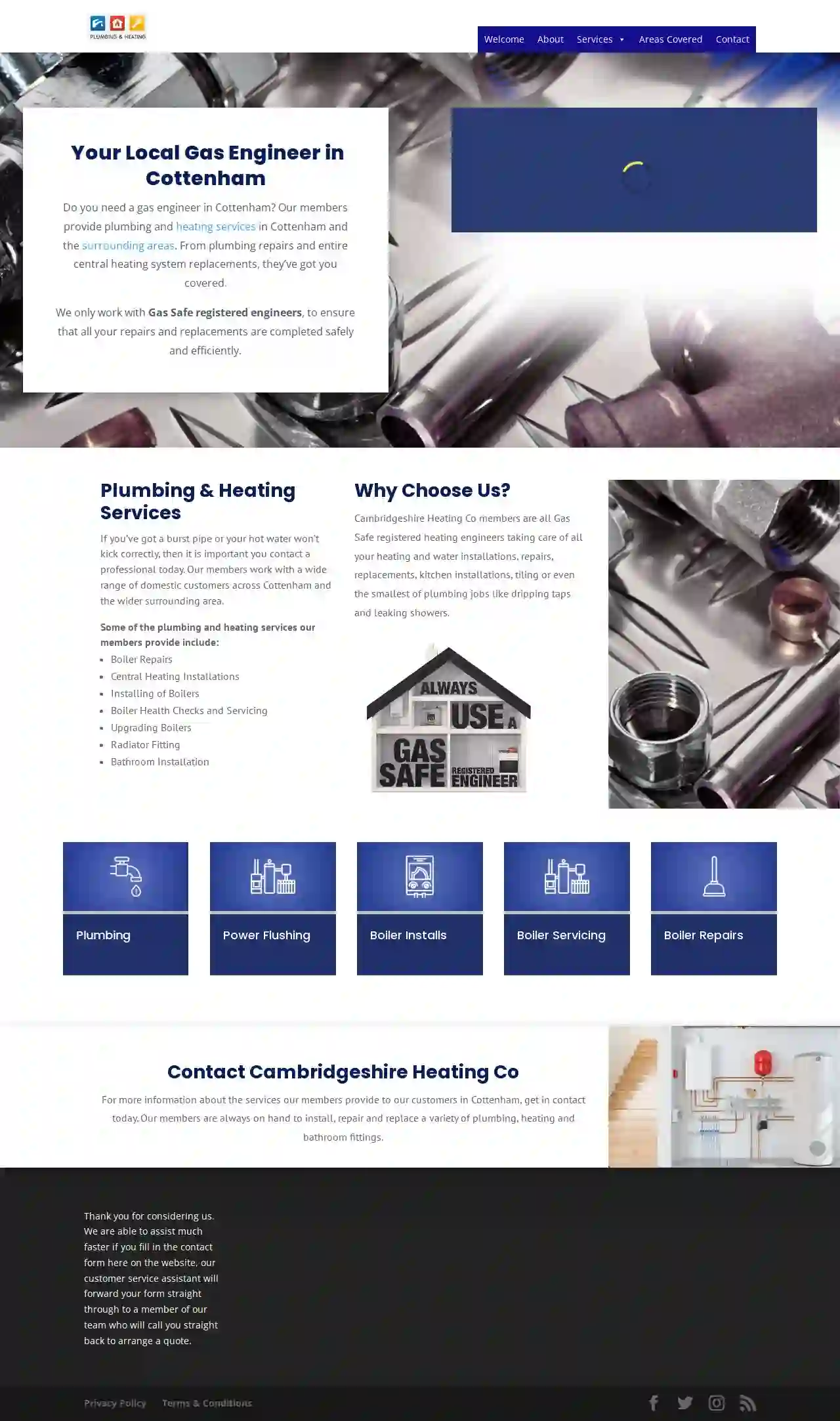
Mike Neville Gas Services
53 reviewsCherry Hinton Road, Cambridge, Unit 1, The Business Centre, CB23 6AA, GBCambridgeshire Heating Co is a network of Gas Safe registered heating engineers serving Cambridgeshire and the surrounding areas. They offer a comprehensive range of plumbing and heating services, from small repairs like dripping taps to large-scale installations like central heating systems. Their team of experienced engineers is dedicated to providing safe, efficient, and reliable service to all their customers. Whether you need a boiler repair, a new boiler installation, or help with your central heating, Cambridgeshire Heating Co has you covered.
- Services
- Why Us?
- Gallery
Get Quote
PJS Heating Plumbing Gas Engineers
1Cambridge, GBWe are PJS Heating, Plumbing and Gas Engineers. We cover all of the Huntingdon Area including Godmanchester, Huntingdon, St Ives, Ramsey, Chatteris and anywhere in between! We also travel as far as Peterborough and Cambridge if necessary. If you would like a quote for out of our area, please get in touch. We offer plumbing works including bathrooms, central heating installations, new boiler installations, system and boiler maintenance, unvented cylinders, air conditioning installation and maintenance, and general plumbing works. We are a member of Gas Safe and F GAS Register.
- Services
- Why Us?
- Gallery
Get Quote
Eurocool Ltd
592 reviewsOrton Wistow, The Rookery, Peterborough, PE2 6YT, GBWelcome to EuroCool Air Conditioning! We offer quality and affordable domestic and commercial Air Conditioning installations in Peterborough, Cambridge and the surrounding areas. We’ve been trading for over 20 years so if you are looking for a competitive, professional and trustworthy Air Conditioning installation contact us today. We will undertake any project from Home and Conservatory Air Conditioning to Industrial/Business/Commercial HVAC. Our units are both heating and cooling systems so you can heat and cool only the rooms you need. All Engineers are all fully F-Gas qualified and offer a professional, tidy and quality service from start to finish. Customer service is our number 1 priority. Our 5-star customer reviews are testament to our great service. Click here to read our google reviews.
- Services
- Why Us?
- Testimonials
- Gallery
Get Quote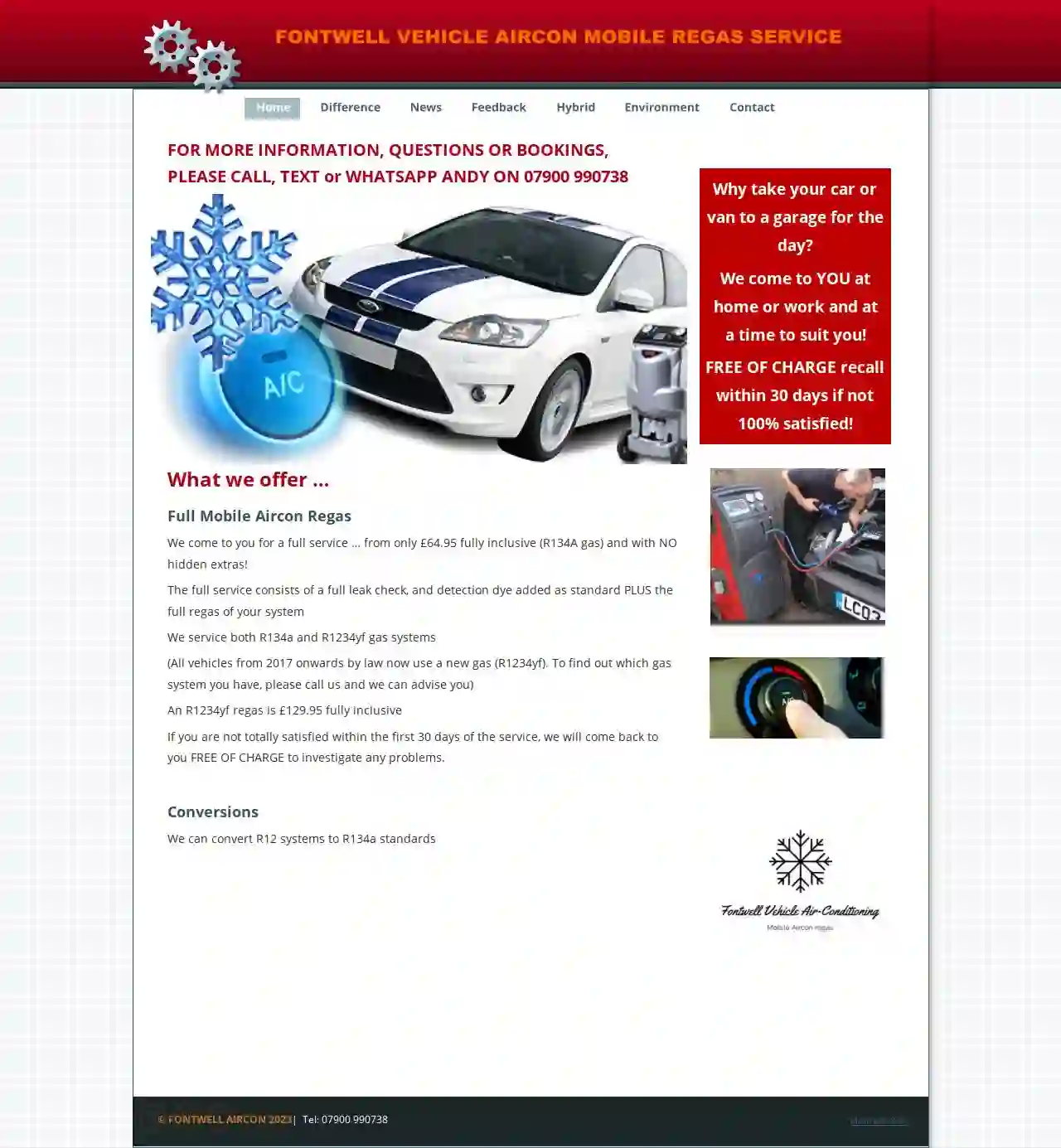
Mobile regas service
558 reviewsFontwell Aircon, Cambridge, CB2, GBFontwell Aircon is a mobile air conditioning service that comes to you, providing a full service from only £64.95 fully inclusive. We service both R134a and R1234yf gas systems, and can convert R12 systems to R134a standards. We are committed to doing all we can within current legislation to act as responsibly as possible in regard to sustainability and the environment. We recycle where appropriate and all our gas is obtained with containers for life, which we send to be refilled. All oils and parts are recycled. We cover all areas within a 25-mile radius of central Cambridge and can be found on site at many specialist car shows.
- Services
- Why Us?
- Accreditations
- Our Team
- Testimonials
- Gallery
Get Quote
Premiair Air Conditioning & Refrigeration Ltd
4.939 reviewsUnit 70, Papyrus Road, Peterborough, PE4 5BH, GBPremiair is Peterborough’s leading air conditioning design, supply, installation and maintenance specialist. Through honest friendly and professional trading, Premiair has become the preferred nationwide company for most domestic customers, commercial customers and local authorities. Starting with a free consultation and site survey through to installation, servicing, maintenance contracts and after care to the highest standards, our welcoming, experienced reception staff will handle your enquiry directing you to the appropriate member of our team to provide you with the advice and service you require.
- Services
- Why Us?
- Testimonials
- Gallery
Get Quote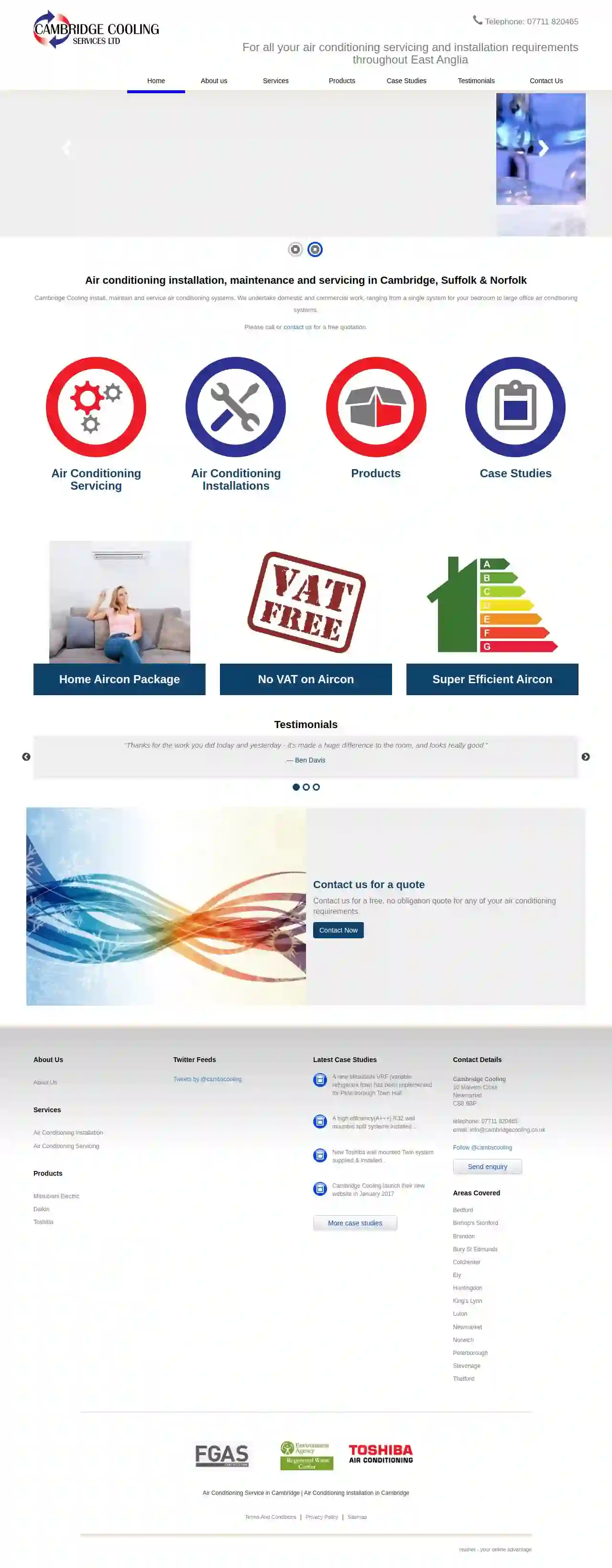
Cambridge Cooling Services Ltd
1Cambridge, GB- Services
- Why Us?
Get Quote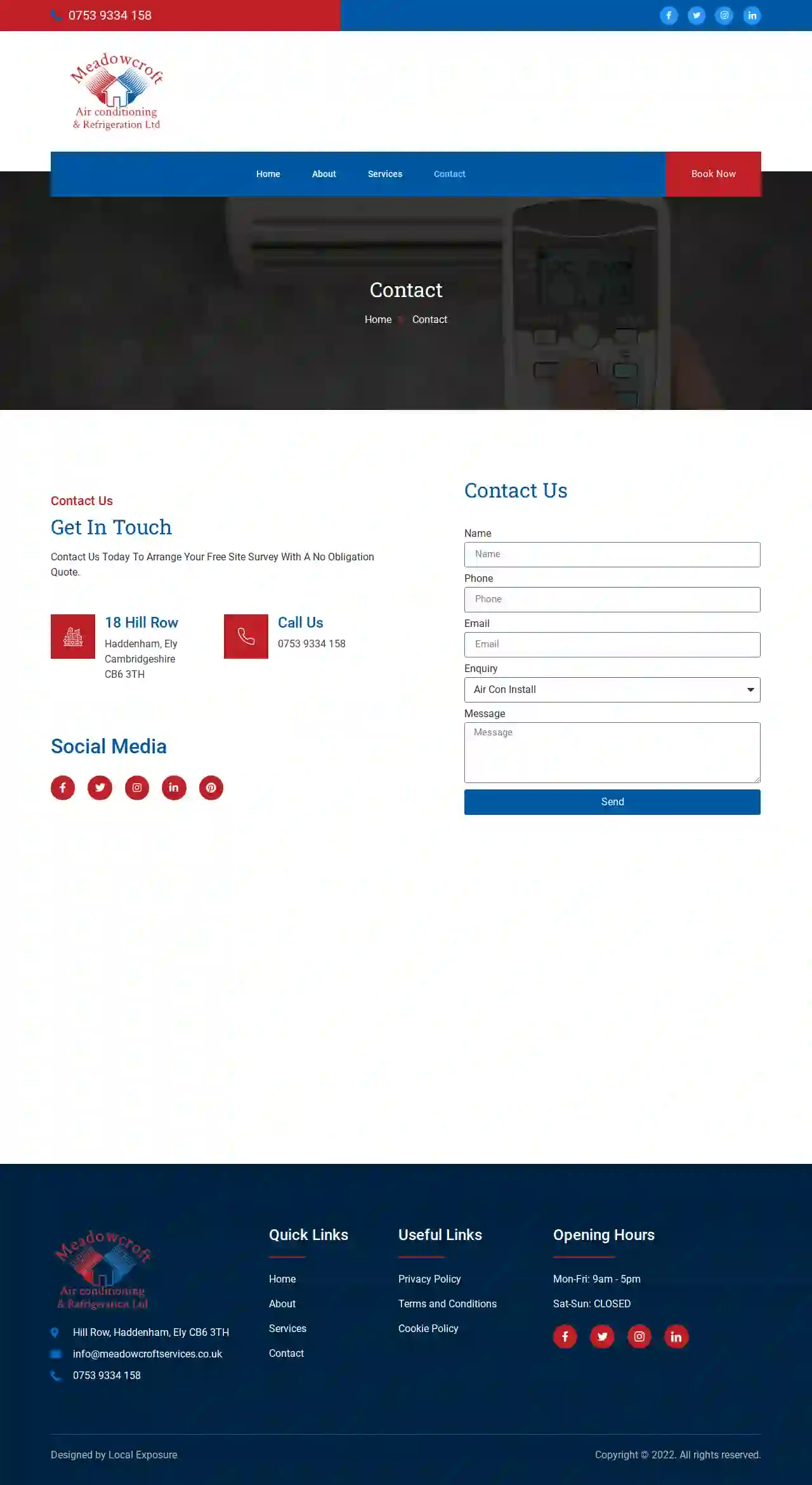
Meadowcroft Air Conditioning
1Cambridge, GB- Services
- Why Us?
Get Quote
Service My Heat Pump
57 reviewsCambridge, GBService My Heat Pump is a professional, manufacturer-trained and accredited engineer who can check and service your heat pump, resolve issues with your solar photovoltaic (PV) panel system, and clean and replace filters in your Mechanical Ventilation with Heat Recovery (MVHR) system. The regular system service starts from only £150.00*. We service and maintain a range of heat pumps, Solar PV and mechanical ventilation heat recovery systems. Get a free quote. Specialists In Heat Pump, Solar PV and MVHR Servicing. Service My Heat Pump – for professional, manufacturer-trained and accredited engineers who can check and service your heat pump, resolve issues with your solar photovoltaic (PV) panel system, and clean and replace filters in your Mechanical Ventilation with Heat Recovery (MVHR) system.
- Services
- Why Us?
- Gallery
Get Quote
Over 1,991+ HVAC Companies on our platform
Our HVAC experts operate in Cambridge and beyond!
HVACCompaniesHub has curated and vetted the Best HVAC Companies arround Cambridge. Find a top & trustworthy contractor today.
Frequently Asked Questions about AC Replacement
- Check for Obvious Issues: Look for simple problems, like a tripped circuit breaker or a dirty air filter.
- Turn Off the Unit: If you can't identify a quick fix, turn off your AC unit at the thermostat to prevent further damage.
- Contact a Qualified HVAC Technician: Reach out to a licensed professional for repairs. If it's an emergency, contact an emergency HVAC service.
- Document the Problem: If possible, note the specific symptoms and take photos or videos of the problem to show the technician.
- Prepare Questions: Make a list of questions for the technician to ensure you understand the problem, repair options, and costs.
- Clear the Area: Remove any obstacles around the indoor and outdoor units, such as furniture, plants, or debris.
- Protect Your Belongings: Cover furniture and floors near the installation area to protect them from dust or debris.
- Provide Access: Make sure the installers have unobstructed access to all areas where they'll be working.
- Trim Plants: Trim any plants or bushes near the outdoor unit that might restrict access.
- Communicate: Discuss the installation process with your contractor and address any questions or concerns.
- Central AC Units: These systems cool your entire home using ductwork to circulate cool air. Central air systems can provide excellent comfort.
- Ductless Mini-Splits: Consisting of indoor and outdoor units that provide zoned cooling. Mini-splits can offer significant energy savings and greater control over your home's temperature.
- Window AC Units: A good option for smaller spaces or apartments. They're relatively inexpensive but can be noisy and less efficient than other options.
- Portable AC Units: These units can be moved easily and offer a flexible option for supplemental cooling in various rooms. Consider portability when access to windows might be difficult.
- Heat Pumps: These systems can both provide year-round climate control. They offer excellent energy efficiency by transferring heat instead of generating it directly.
- Geothermal Heat Pumps: Geothermal heat pumps use the stable temperature of the earth to heat and cool your home. Though they require a significant upfront investment, the long-term energy savings are substantial.
What size AC unit do I need for my home?
What should I do if my AC breaks down?
How do I prepare for an AC replacement installation?
What are the different types of air conditioners?
What size AC unit do I need for my home?
What should I do if my AC breaks down?
- Check for Obvious Issues: Look for simple problems, like a tripped circuit breaker or a dirty air filter.
- Turn Off the Unit: If you can't identify an easy solution, turn off your AC unit at the thermostat to prevent further damage.
- Contact a Qualified HVAC Technician: Reach out to a licensed professional for repairs. If it's an emergency, contact an emergency HVAC service.
- Document the Problem: If possible, note the specific symptoms and take photos or videos of the problem to show the technician.
- Prepare Questions: Make a list of questions for the technician to ensure you understand the problem, repair options, and costs.
How do I prepare for an AC replacement installation?
- Clear the Area: Ensure the installers have easy access to your existing unit and the installation location for the new one.
- Protect Your Belongings: Cover furniture and floors near the installation area to protect them from dust or debris.
- Provide Access: Make sure the installers have unobstructed access to your home's electrical panel, attic, or crawl space.
- Trim Plants: Trim any plants or bushes near the outdoor unit to provide adequate airflow.
- Communicate: Discuss the installation process with your contractor and address any questions or concerns.
What are the different types of air conditioners?
- Central AC Units: Ideal for whole-home cooling using ductwork to distribute conditioned air. They're energy-efficient and provide consistent cooling throughout your home.
- Ductless Mini-Splits: Best for homes without existing ductwork, these systems have indoor and outdoor units connected by refrigerant lines. They're quiet, efficient, and ideal for targeted area cooling.
- Window AC Units: These are self-contained units designed to cool individual rooms. Window units are generally easy to install.
- Portable AC Units: These units can be moved easily and offer a flexible option for supplemental cooling in various rooms. Consider portability when access to windows might be difficult.
- Heat Pumps: These systems can both heat and cool. They offer excellent energy efficiency by transferring heat instead of generating it directly.
- Geothermal Heat Pumps: Geothermal heat pumps use the stable temperature of the earth to heat and cool your home. They are very efficient, but the initial installation cost can be higher due to the need for ground loops.